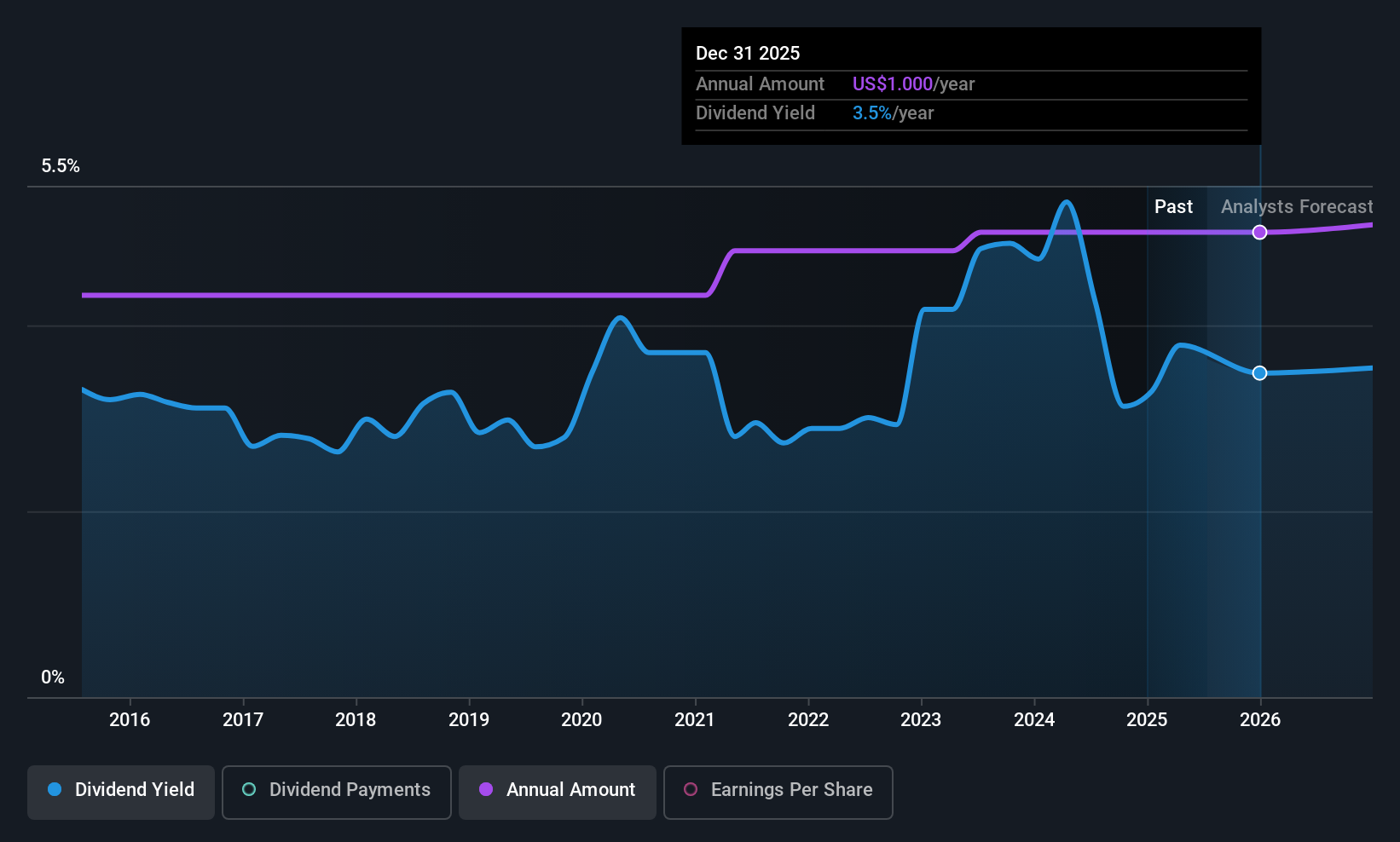Do These 3 Checks Before Buying Dime Community Bancshares, Inc. (NASDAQ:DCOM) For Its Upcoming Dividend
It looks like Dime Community Bancshares, Inc. (NASDAQ:DCOM) is about to go ex-dividend in the next 2 days. The ex-dividend date is usually set to be one business day before the record date, which is the cut-off date on which you must be present on the company's books as a shareholder in order to receive the dividend. The ex-dividend date is important as the process of settlement involves a full business day. So if you miss that date, you would not show up on the company's books on the record date. Therefore, if you purchase Dime Community Bancshares' shares on or after the 17th of July, you won't be eligible to receive the dividend, when it is paid on the 24th of July.
The company's upcoming dividend is US$0.25 a share, following on from the last 12 months, when the company distributed a total of US$1.00 per share to shareholders. Calculating the last year's worth of payments shows that Dime Community Bancshares has a trailing yield of 3.5% on the current share price of US$28.69. If you buy this business for its dividend, you should have an idea of whether Dime Community Bancshares's dividend is reliable and sustainable. As a result, readers should always check whether Dime Community Bancshares has been able to grow its dividends, or if the dividend might be cut.
If a company pays out more in dividends than it earned, then the dividend might become unsustainable - hardly an ideal situation. Dime Community Bancshares distributed an unsustainably high 160% of its profit as dividends to shareholders last year. Without extenuating circumstances, we'd consider the dividend at risk of a cut.
When a company pays out a dividend that is not well covered by profits, the dividend is generally seen as more vulnerable to being cut.
View our latest analysis for Dime Community Bancshares
Click here to see the company's payout ratio, plus analyst estimates of its future dividends.

Have Earnings And Dividends Been Growing?
Businesses with shrinking earnings are tricky from a dividend perspective. Investors love dividends, so if earnings fall and the dividend is reduced, expect a stock to be sold off heavily at the same time. With that in mind, we're discomforted by Dime Community Bancshares's 18% per annum decline in earnings in the past five years. When earnings per share fall, the maximum amount of dividends that can be paid also falls.
We'd also point out that Dime Community Bancshares issued a meaningful number of new shares in the past year. Trying to grow the dividend while issuing large amounts of new shares reminds us of the ancient Greek tale of Sisyphus - perpetually pushing a boulder uphill.
Many investors will assess a company's dividend performance by evaluating how much the dividend payments have changed over time. In the last 10 years, Dime Community Bancshares has lifted its dividend by approximately 1.5% a year on average.
Final Takeaway
From a dividend perspective, should investors buy or avoid Dime Community Bancshares? Earnings per share are in decline and Dime Community Bancshares is paying out what we feel is an uncomfortably high percentage of its profit as dividends. It's not that we hate the business, but we feel that these characeristics are not desirable for investors seeking a reliable dividend stock to own for the long term. This is not an overtly appealing combination of characteristics, and we're just not that interested in this company's dividend.
With that being said, if you're still considering Dime Community Bancshares as an investment, you'll find it beneficial to know what risks this stock is facing. To help with this, we've discovered 2 warning signs for Dime Community Bancshares that you should be aware of before investing in their shares.
Generally, we wouldn't recommend just buying the first dividend stock you see. Here's a curated list of interesting stocks that are strong dividend payers.
Have feedback on this article? Concerned about the content? Get in touch with us directly. Alternatively, email editorial-team (at) simplywallst.com.
This article by Simply Wall St is general in nature. We provide commentary based on historical data and analyst forecasts only using an unbiased methodology and our articles are not intended to be financial advice. It does not constitute a recommendation to buy or sell any stock, and does not take account of your objectives, or your financial situation. We aim to bring you long-term focused analysis driven by fundamental data. Note that our analysis may not factor in the latest price-sensitive company announcements or qualitative material. Simply Wall St has no position in any stocks mentioned.
 Wall Street Journal
Wall Street Journal